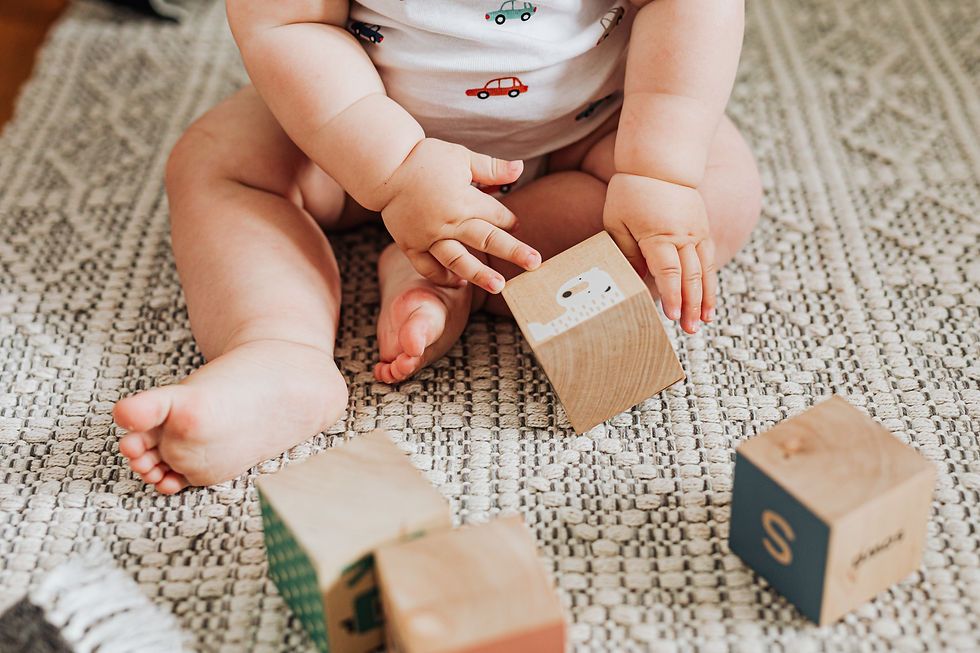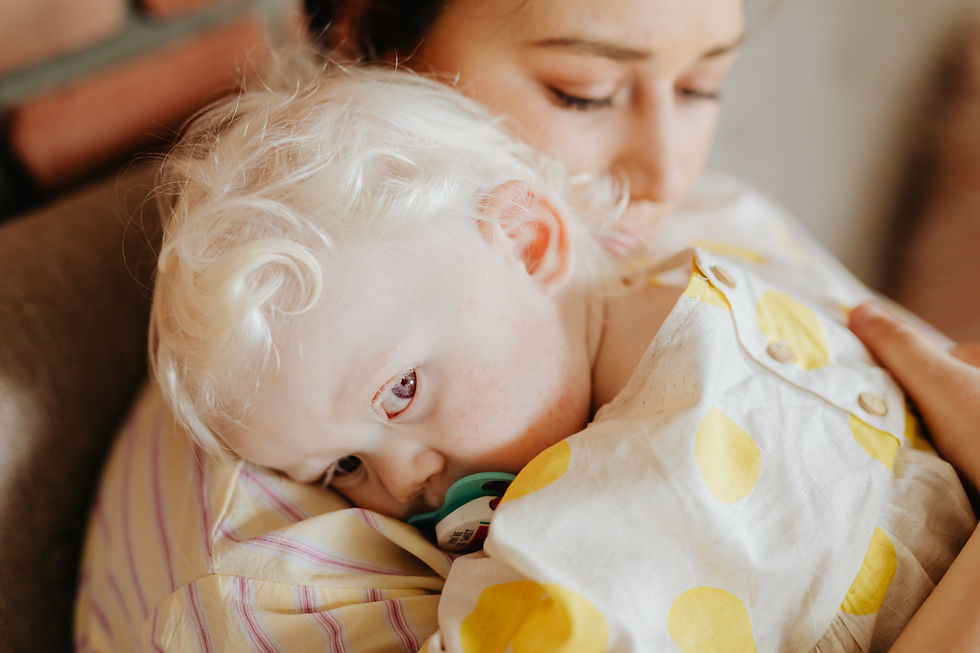Eight Tips for Easing Separation Anxiety
- Gemma Reynolds
- Nov 9, 2022
- 5 min read

Raising children is a huge responsibility, and in the age of social media as well as easy access to information about literally anything, parents become overwhelmed with feelings of guilt and inadequacy.
As a sleep consultant, I genuinely hear this daily from parents that have babies don't sleep well.
Another reason parents think they are doing something wrong when it comes to separation anxiety is how when the child suddenly starts becoming so upset when a parent leaves the room.
This looks like this the child suddenly realises mummy is not is the room and therefore, mummy is somewhere else. The child realises they would rather be with mummy so they will kick off until mummy returns.
This leaves a parent to think "what am I doing wrong?" They believe that a well adjusted baby should feel safe when they are not with mummy for a little while. This is compounded by Laura (from your Mum FB Group) who just posted that her baby is now happily playing on her own whilst she cooks dinner. Also, Katie who you used to work with now has a baby sitter that she can leave her baby with.... you can NEVER imagine your baby doing this!

When thinking this please remember two things:
First, never compare yourself, or your child, to the mothers and babies described in the parenting groups on social media. Much like everything else on Facebook and Instagram, these experiences are almost always conveyed through the rose tinted filters And second, separation anxiety is completely normal, expected, and a sign of a healthy attachment between parent and child.
Ok, so what is separation anxiety?
Separation anxiety usually begins around 6-8 months, when your Little Darling starts to grasp that things continue to exist, even when they’re not in sight. It’s a cognitive milestone known as “object permanence” which is defined as, “the understanding that objects continue to exist even when they cannot be observed.” In other words, out of sight no longer means out of mind.
So as your baby begins to grasp this concept, they realise that if you, their favorite person in the whole world, are not there, you’re elsewhere. And, hey, wait a minute. If that’s the case, then you might not be coming back. It’s kind of fascinating when you think about it, but it’s also a little heartbreaking.
This realisation, for a baby, is obviously cause for full-blown panic. The thought of a parent leaving and not returning causes anxiety in most grown-ups I know, so you can hardly expect an infant to take it with great decorum. Anyways, that’s what happens in your little one’s brain when they suddenly start having a fit every time you leave the room. It’s normal, it’s natural, and it’s a sign that your little one is learning, and that they have a secure attachment to their parent.
Amazing. But, as many of us know, it also means that leaving them with a babysitter or dropping them off at nursery can be an absolute horror show. But what we really want to know, or at least what I really wanted to know when it happened with my child, isn’t “What is causing this?” What I wanted to know was, “How do I stop it?”
Well, the truth is, you probably wouldn’t want to if you could. I mean, really, wouldn’t you be just a little devastated if you left your child with a stranger and they were just completely OK with it? “Bye Mummy! See you at dinner! Don’t worry about me. You guys have fun!”.
I’m guessing that would actually be significantly more troubling than some tears and howling. But we obviously want to keep things at a happy medium, and if you’re struggling with a child who is having a meltdown every time you try to take a shower or head out for girls night.
I’ve got some suggestions to take the edge off until this phase runs its course:
1. Lead by Example

Your little one follows your cues, so if you’re not willing to let her out of your sight, they probably, albeit unconsciously, feel like they’re not safe if you’re not in the room. So designate a room where they can explore a little and play without your direct supervision. It’s a small adjustment, but it has a tremendous effect.
2. Don’t Avoid It

Learning about separation and reunion is an important milestone, so don’t just take the path of least resistance and stay with your child 24/7 until they’re seven years old. (It happens. Believe me.) Let them know that it’s okay for them to get upset when you leave and reassure them that you’ll always come back when you do. If there are some tears around it, that’s alright. This is an important concept that they need to get on board with.
3. Start Slow

Once your little one has started to demonstrate the understanding that they’ll be spending some time with someone besides a parent, make it a short outing. Don’t plan on dinner and the cinema or an overnight trip for the first few attempts.
4. Start With Someone Familiar

Children typically do a little better being left with a grandparent or family friend who they’ve already spent some time with, and who they’ve grown to trust a little, so call in a favour, put some wine in the fridge, and plan to spend at least an hour away from the house for the first few attempts.
5. Stick Around for a While

After your babysitter, parent, friend, or whoever is watching your little one arrives, plan to hang around for a half hour or so. Seeing that this is someone you’re familiar with will go a long way in reassuring your child that they’re “good people” and worthy of their trust.
6. Face the Music

Many of us have, at least once, attempted to distract our toddlers and then sneak out the door without saying goodbye. After all, it’s the goodbye that provokes the reaction, right? But even if it provokes some tears, it’s important for your child to understand that you’re going to leave sometimes, and that you’ll be back when you say you will.
7. Establish a Routine

Much like bedtime, a solid, predictable goodbye routine helps your little one recognise and accept the situation. A set number of kisses and hugs, a memorable key phrase, and a clear indication of when you’ll be back should be just the right balance of short and reassuring.
8. Speak in Terms They’ll Understand

Instead of telling them how long you’ll be gone, tell them when you’ll be back in regards to their schedule. After nap time, before bed, after dinner, before bath time, and so on. Nothing is going to prevent your child from getting a little bit upset when you leave but you can definitely keep the fuss to a minimum.
Now, I should add here that these techniques are suggested for kids who are dealing with ordinary, everyday separation anxiety. There is also a condition called Separation Anxiety Disorder which is obviously more serious and warrants a trip to your Doctor if you suspect your little one might be afflicted with it. However, for normal meltdowns that happen when you leave the house, these tips should really help.
Be consistent, supportive, assertive, and calm. Before long, your child will understand the concept of you leaving and coming back.
DO YOU FEEL LIKE SEPERATION ANXIETY IS LEADING TO POOR SLEEP? Book a free call to discuss how I can help manage this with one of my sleep packages.
.png)



Comments